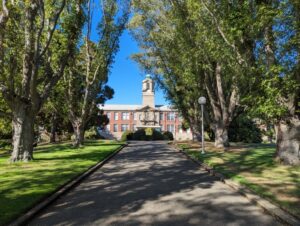The BC Federation of Students (BCFS) has recently launched the Rise Up campaign, which calls for more government funding for post-secondary institutions, and less of a reliance on international student fees.
The Rise Up campaign was born from two other BCFS campaigns: Fairness to International Students and Fund It, Fix It. BCFS secretary-treasurer Jessie Niikoi says that the issues covered in the earlier campaigns boiled down to a lack of government funding.

“We just decided to bring [the campaigns] together, because, in the end, we realized that all of these issues come down to funding,” says Niikoi. “If institutions are not funded properly it leads to them over-relying on international students, and the government needs to do better in actually funding schools. So, the campaign was just bringing together these two campaigns, but then going to students and being like, ‘It is time for you guys to rise up now and come together and ask the government for funding,’ because we’re in a time where things are unaffordable, and students need to also speak up for themselves.”
Niikoi says that post-secondary institutions started to become overly reliant on international student fees around the time that the government announced a strategy to bring in more international students. This, coupled with high tuition and a $29,000 average of student debt, has resulted in a poor financial climate for students.
“There was the announcement of an international education strategy, in around 2012, we realized that there is less and less funding for schools,” she says. “That led to more schools deciding to find ways to find the money and because of the international education strategy, where BC was looking to bring more international students in. That was where the funding issues started happening, that’s when schools started relying on international students for more money.”
According to the BCFS, in 2000, the provincial government provided 68 percent of operating costs to post-secondary institutions, but that has since dropped to 40 percent.
“I think what we would like to see is the government take on the work of funding institutions because this is an issue that is affecting students,” says Niikoi. “And if we are an essential part of the workforce, and we are needed in the next few years for the workforce, putting a barrier such as unaffordable education is not the right way to go about it… The government needs to step up and then get to it.”
Niikoi wants to see students get involved with the campaign and share their stories. She believes that students need to advocate for themselves before the situation worsens.
“Students should get involved because this current issue is something that is affecting all of them,” says Niikoi. “Because right now, students are at the forefront of the issues that are happening. We’re not only burdened with an affordability crisis, we’re also burdened with school and tuition costs. So, students need to come together and speak up because now more than ever, things are getting worse.”
Niikoi says that BCFS won’t stop pushing for change until the desired outcome is reached.
“It’s a running thing all year round,” she says. “We’re still doing action, we’re still doing work regardless of when they join. Because, until we get what we asked for from the Rise Up campaign, which is the cap on international student tuition, which is more grants for students so they don’t leave school in debt, and also the funding for the institutions… If none of that has happened this campaign is still going to keep going because it is a continuous issue. We’re going to keep fighting for students.”
Camosun College students are all members of the BCFS. Students can visit rise-up.ca at any time to join the campaign.
